 Today is the feast of Saint Melchizedek, King of Salem and High Priest of El Elyon.
Today is the feast of Saint Melchizedek, King of Salem and High Priest of El Elyon.
The image: @LawrenceOP
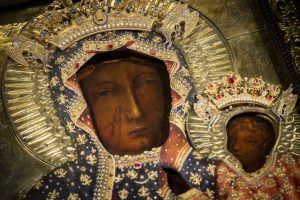 Today we celebrate the Feast of Our Lady of Czestochowa, the Black Madonna. The missionary and miraculous icon of Our Lady resides at The Pauline monastery at Jasna Gora. In 1717, the image was ceremoniously crowned and Jasna Gora became the center of a Marian devotion in Poland. Having been to the Shrine, I can attest that it is a beautiful and moving place.
Today we celebrate the Feast of Our Lady of Czestochowa, the Black Madonna. The missionary and miraculous icon of Our Lady resides at The Pauline monastery at Jasna Gora. In 1717, the image was ceremoniously crowned and Jasna Gora became the center of a Marian devotion in Poland. Having been to the Shrine, I can attest that it is a beautiful and moving place.
St. John Paul II: “Jasna Gora is the Shrine of the nation. One must put their ear to this holy place to feel the heart of the nation beating in the Mother’s Heart. And it beats, as we know, all the tones of history, all the sounds of life”.
As with Poland so here in the USA, may then”heart of the nation beating in the Mother’s Heart”, may Our Lady of Czestochowa, pray for us.
Throughout the history of Eastern monasticism, there has always been an understanding of silence and solitude that has been called “hesychia”. Hesychia refers to a state of inner stillness and stability that is increasingly able to discern the presence of God in the length and breadth of the everyday. It involves an attitude of listening that focuses the heart, regardless of what one happens to be doing. But the truth is, such silence does not come cheap. It requires practice, a type of spiritual practice that leads one through many levels of growth. This has its analogy in athletic practice, where to reach excellence demands self-sacrifice, personal commitment, making mistakes, and hours and hours of work. (thanks to NS)
𝗛𝗼𝗺𝗶𝗹𝘆 𝗜𝗜 𝗼𝗻 𝘁𝗵𝗲 𝗗𝗼𝗿𝗺𝗶𝘁𝗶𝗼𝗻 𝗯𝘆 𝗦𝘁. 𝗝𝗼𝗵𝗻 𝗼𝗳 𝗗𝗮𝗺𝗮𝘀𝗰𝘂𝘀
“𝑇𝑜𝑑𝑎𝑦 𝑡ℎ𝑒 𝐸𝑑𝑒𝑛 𝑜𝑓 𝑡ℎ𝑒 𝑁𝑒𝑤 𝐴𝑑𝑎𝑚 𝑤𝑒𝑙𝑐𝑜𝑚𝑒𝑠 𝑡ℎ𝑒 𝑠𝑝𝑖𝑟𝑖𝑡𝑢𝑎𝑙 𝑃𝑎𝑟𝑎𝑑𝑖𝑠𝑒 𝑤ℎ𝑒𝑟𝑒 𝑜𝑢𝑟 𝑐𝑜𝑛𝑑𝑒𝑚𝑛𝑎𝑡𝑖𝑜𝑛 ℎ𝑎𝑠 𝑏𝑒𝑒𝑛 𝑐𝑎𝑛𝑐𝑒𝑙𝑙𝑒𝑑, 𝑤ℎ𝑒𝑟𝑒 𝑡ℎ𝑒 𝑇𝑟𝑒𝑒 𝑜𝑓 𝐿𝑖𝑓𝑒 𝑖𝑠 𝑝𝑙𝑎𝑛𝑡𝑒𝑑, 𝑤ℎ𝑒𝑟𝑒 𝑜𝑢𝑟 𝑛𝑎𝑘𝑒𝑑𝑛𝑒𝑠𝑠 𝑖𝑠 𝑐𝑙𝑜𝑡ℎ𝑒𝑑 𝑎𝑔𝑎𝑖𝑛. 𝐹𝑜𝑟 𝑤𝑒 𝑎𝑟𝑒 𝑛𝑜 𝑙𝑜𝑛𝑔𝑒𝑟 𝑛𝑎𝑘𝑒𝑑 𝑎𝑛𝑑 𝑒𝑥𝑝𝑜𝑠𝑒𝑑, 𝑙𝑎𝑐𝑘𝑖𝑛𝑔 𝑡ℎ𝑒 𝑟𝑎𝑑𝑖𝑎𝑛𝑐𝑒 𝑜𝑓 𝑡ℎ𝑒 𝐷𝑖𝑣𝑖𝑛𝑒 𝐼𝑚𝑎𝑔𝑒 𝑎𝑛𝑑 𝑠𝑡𝑟𝑖𝑝𝑝𝑒𝑑 𝑜𝑓 𝑡ℎ𝑒 𝑎𝑏𝑢𝑛𝑑𝑎𝑛𝑡 𝑔𝑟𝑎𝑐𝑒 𝑜𝑓 𝑡ℎ𝑒 𝑆𝑝𝑖𝑟𝑖𝑡; 𝑤𝑒 𝑛𝑒𝑒𝑑 𝑛𝑜 𝑙𝑜𝑛𝑔𝑒𝑟 𝑡𝑒𝑙𝑙 𝑡ℎ𝑒 𝑠𝑡𝑜𝑟𝑦 𝑜𝑓 𝑡ℎ𝑎𝑡 𝑡𝑟𝑎𝑔𝑖𝑐, 𝑎𝑛𝑐𝑖𝑒𝑛𝑡 𝑛𝑎𝑘𝑒𝑑𝑛𝑒𝑠𝑠, 𝑠𝑎𝑦𝑖𝑛𝑔, “𝐼 ℎ𝑎𝑣𝑒 𝑡𝑎𝑘𝑒𝑛 𝑜𝑓𝑓 𝑚𝑦 𝑡𝑢𝑛𝑖𝑐, 𝑎𝑛𝑑 ℎ𝑜𝑤 𝑠ℎ𝑎𝑙𝑙 𝐼 𝑝𝑢𝑡 𝑖𝑡 𝑜𝑛 𝑎𝑔𝑎𝑖𝑛?” (𝑆𝑜𝑛𝑔𝑠 5:3) 𝐹𝑜𝑟 𝑖𝑛 𝑡ℎ𝑖𝑠 𝑃𝑎𝑟𝑎𝑑𝑖𝑠𝑒, 𝑡ℎ𝑒 𝑠𝑒𝑟𝑝𝑒𝑛𝑡 ℎ𝑎𝑠 𝑛𝑜 𝑚𝑒𝑎𝑛𝑠 𝑜𝑓 𝑒𝑛𝑡𝑟𝑦 – 𝑡ℎ𝑎𝑡 𝑠𝑒𝑟𝑝𝑒𝑛𝑡 𝑤ℎ𝑜𝑠𝑒 𝑓𝑎𝑙𝑠𝑒 𝑝𝑟𝑜𝑚𝑖𝑠𝑒 𝑜𝑓 𝑑𝑖𝑣𝑖𝑛𝑖𝑠𝑎𝑡𝑖𝑜𝑛 𝑙𝑒𝑑 𝑢𝑠 𝑡𝑜 𝑎 𝑐𝑜𝑣𝑒𝑡𝑜𝑢𝑠𝑛𝑒𝑠𝑠 𝑡ℎ𝑎𝑡 𝑚𝑎𝑑𝑒 𝑢𝑠 𝑡ℎ𝑒 𝑒𝑞𝑢𝑎𝑙 𝑜𝑛𝑙𝑦 𝑜𝑓 𝑖𝑟𝑟𝑎𝑡𝑖𝑜𝑛𝑎𝑙 𝑏𝑒𝑎𝑠𝑡𝑠. 𝑇ℎ𝑒 𝑜𝑛𝑙𝑦 𝑆𝑜𝑛 𝑜𝑓 𝐺𝑜𝑑, 𝑤ℎ𝑜 𝑖𝑠 𝐺𝑜𝑑 𝑎𝑛𝑑 𝑜𝑓 𝑡ℎ𝑒 𝑠𝑎𝑚𝑒 𝑠𝑢𝑏𝑠𝑡𝑎𝑛𝑐𝑒 𝑎𝑠 𝑡ℎ𝑒 𝐹𝑎𝑡ℎ𝑒𝑟, 𝑓𝑜𝑟𝑚𝑒𝑑 𝐻𝑖𝑚𝑠𝑒𝑙𝑓 𝑖𝑛𝑡𝑜 𝑎 ℎ𝑢𝑚𝑎𝑛 𝑏𝑒𝑖𝑛𝑔 𝑓𝑟𝑜𝑚 𝑡ℎ𝑖𝑠 𝑉𝑖𝑟𝑔𝑖𝑛, 𝑓𝑟𝑜𝑚 𝑡ℎ𝑖𝑠 𝑝𝑢𝑟𝑒 𝑠𝑜𝑖𝑙; 𝑎𝑛𝑑 𝑠𝑜 𝐼, 𝑤ℎ𝑜 𝑎𝑚 ℎ𝑢𝑚𝑎𝑛, 𝑎𝑚 𝑚𝑎𝑑𝑒 𝑑𝑖𝑣𝑖𝑛𝑒 – 𝐼, 𝑤ℎ𝑜 𝑎𝑚 𝑚𝑜𝑟𝑡𝑎𝑙, ℎ𝑎𝑣𝑒 𝑛𝑜𝑤 𝑏𝑒𝑐𝑜𝑚𝑒 𝑖𝑚𝑚𝑜𝑟𝑡𝑎𝑙, 𝑎𝑛𝑑 ℎ𝑎𝑣𝑒 𝑠𝑡𝑟𝑖𝑝𝑝𝑒𝑑 𝑜𝑓𝑓 𝑚𝑦 𝑡𝑢𝑛𝑖𝑐 𝑜𝑓 𝑠𝑘𝑖𝑛. 𝐹𝑜𝑟 𝐼 ℎ𝑎𝑣𝑒 𝑡𝑎𝑘𝑒𝑛 𝑜𝑓𝑓 𝑐𝑜𝑟𝑟𝑢𝑝𝑡𝑖𝑜𝑛, 𝑎𝑛𝑑 𝑝𝑢𝑡 𝑜𝑛 𝑡ℎ𝑒 𝑟𝑜𝑏𝑒 𝑜𝑓 𝑑𝑖𝑣𝑖𝑛𝑖𝑡𝑦.”
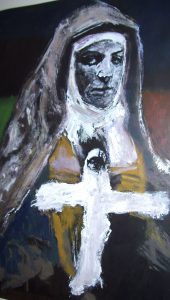 Today in the Latin Church is the commemoration of Carmelite St. Teresa Benedicta – Edith Stein. Addressing himself to the young people gathered for the canonization in 1998, Pope John Paul II recounted the saint’s decision to reject a possible “way out”…”Do not do it! Why should I be spared? Is it not right that I should gain no advantage from my Baptism? If I cannot share the lot of my brothers and sisters, my life, in a certain sense, is destroyed.”
Today in the Latin Church is the commemoration of Carmelite St. Teresa Benedicta – Edith Stein. Addressing himself to the young people gathered for the canonization in 1998, Pope John Paul II recounted the saint’s decision to reject a possible “way out”…”Do not do it! Why should I be spared? Is it not right that I should gain no advantage from my Baptism? If I cannot share the lot of my brothers and sisters, my life, in a certain sense, is destroyed.”
The image by Father Peter Willm Gray.
St Teresa Benedicta of the Cross, pray for us.
We pray for all those who work and live from the sea, among them sailors, fishermen and their families.
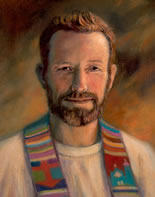 Today is the Feast of Blessed Stanley Rother, martyr.
Today is the Feast of Blessed Stanley Rother, martyr.
As Pope Francis said on the occasion of his beatification in 2017, ““[Yesterday], in Oklahoma City, the missionary priest, Stanley Francis Rother, killed in hatred of the faith for his work of evangelization, and work to promote the human dignity of the poorest people in Guatemala, was proclaimed Blessed. May his heroic example help us to be courageous witnesses to the Gospel, committed to working [on] behalf of the dignity of man.”
 The emphasis in the spiritual life is on our searching for God. It is difficult not to admit this from the abundance of scriptural sources and the the witness of the saints. We know the accent of seeking when St Benedict makes this the key vocation matter in his Holy Rule. Sometimes I wonder, however, if it is more of realization that we do not find Him, but He has found us. Do we believe that God seeks us? Perhaps it is the experience of both of God seeking us, and we Him. I am thinking of the poem of Francis Thompson, “The Hound of Heaven.”
The emphasis in the spiritual life is on our searching for God. It is difficult not to admit this from the abundance of scriptural sources and the the witness of the saints. We know the accent of seeking when St Benedict makes this the key vocation matter in his Holy Rule. Sometimes I wonder, however, if it is more of realization that we do not find Him, but He has found us. Do we believe that God seeks us? Perhaps it is the experience of both of God seeking us, and we Him. I am thinking of the poem of Francis Thompson, “The Hound of Heaven.”
Nevertheless, St. Gregory the Great describes in terms applicable to anyone seriously engaged in the search for God: “At first she sought but did not find, but when she persevered it happened that she found what she was looking for. When our desires are not satisfied they grow stronger… Holy desires likewise grow with anticipation… Anyone who succeeds in attaining the truth has burned with such a love.”
Back to St. Benedict. His first idea for his school is that prayer should be central to those who seek God. Like the saints teach us, you can’t find the Lord without spending time with Him, listening to Him, learning from him and praising Him. Mother Church gives various methods of prayer: in her liturgies like the Sacrifice of the Mass (Divine Liturgy) and the Divine Office, in Eucharistic Adoration, lectio divina, the Holy Rosary, silence, quiet works of charity, and just simply opening your heart and mind to God, giving Him praise and asking for His help and intercession. Then there is obedience to all of the above and to our spiritual director, the way of humility and the experience of community.
We don’t find God alone, but with and through others; so with St. Mary Magdalen, may we search and find God. May the Magadeln pray for us.
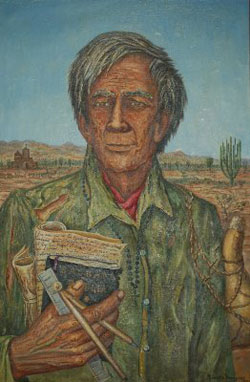
On July 10, 2020, the Pope acknowledged the heroic virtue of the Servant of God Eusebio Francesco Chini (Kino), a priest of the Society of Jesus. Thus, the sainthood cause moves ahead.
Kino, as we know him, was born on 10 August 1645 in Segno, Italy and died in Magdalena, Mexico on 15 March 1711. He was a trained mathematician wanted to imitate the great Saint Francis Xavier. The Jesuit Provincial sent Father Kino to serve as a missionary in what was known as New Spain now Arizona, southern California and Mexico. Kino was called the Horseback priest because his travels covered more than 50,000 square miles on horseback.
At the time of Father Kino’s work the Spaniards forced the native peoples, in particular the Sonoran Indians, to be slaves in the mines. Father Kino was known to oppose the slavery and compulsory hard labor. In today’s atmosphere Kino would be roundly rejected the religious left and secularists. However, Kino contributed to the welfare of others through Catholic Faith, missionary work, education, economy, farming, map making, and constructing.
As a priest he taught others about the truth of Jesus Christ, the need for the Church and her sacraments, and personally baptizing 4,500 people.
His agricultural work draws my attention because it taps into to the care of the person and society. Agriculture also links other things together: faith, reason, science, nutrition, and common sense. Some standards have changed since Kino’s work 400 years ago, but we can see the lines of care and concern for the health of people he interacted with as a missionary. Kino introduced seeds, fruits, herbs, grains, and animal husbandry (beef, sheep, and goats).
Kino now carries the title of Venerable Servant of God. We await a miracle attributed to his intercession. I am looking forward to his beatification someday soon. Father Kino had a generous spirit and a generative character; it is clear to me that his humanity was expansive because of his love of Christ.
Today is the summer feast of the Holy Patriarch Benedict.
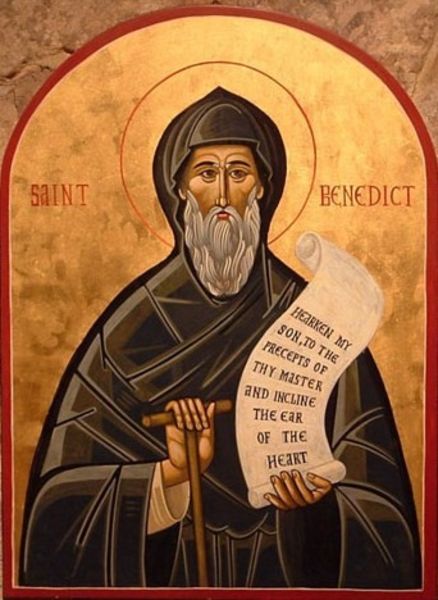
It is a day to heed the advice of Benedict: seek the Lord and listen to him. It is also a day to celebrate the feast with beer made by monks.
Benedict’s vision for monastic life is that the monk/nun live in community. One’s life in a stable, permanent community locates and lives the reality of the Lord’s Incarnation. We are keenly reminded that in Benedict’s experience human interaction shows an experience of Christ: the abbot holds the place of Christ; Christ in the guest, in the young monks, and in the seniors. Ultimately, no one is excluded in the Benedictine vision monastic life: every human interaction the monk/nun meets the Lord, in the flesh. This is keenly true for the Oblate and every other person.
I am remembering the words of Saint John Paul II had for the sons and daughters of Benedict: “May every Benedictine community present itself with a well-defined identity, like a “city on a hill,” distinct from the surrounding world, but open and welcoming to the poor, to pilgrims and to all who are searching for a life of greater fidelity to the Gospel!”
As with all solemn feasts in the Tradition of the Church there is an octave. It is a way to continue to enjoy and relish and to attend to the graces of the feast! Over the next 8 days how will you celebrate St Benedict? What grace will you beg from the Holy Spirit? How will you live the charism bequeathed to us by Benedict and his children through the ages?